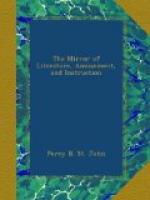General Miller’s share in the triumph of Junin was witnessed by Bolivar, in August, 1824; and at the victory of Ayacucho, which terminated the war in Peru, general Miller was foremost in the thickest of the fight.
We are now drawing near to the close of our outline of the general’s brilliant career. At the conclusion of the war in 1825, he was appointed prefect of the department of Potosi, with a population of 300,000 souls. He was going on prosperously in his labours of peace, in improving the condition of the natives, who had for three centuries been writhing under the most infamous oppression, when his health required that he should visit Europe. In October, 1825, he resigned his honourable office, and obtained leave of absence to return to his native country, bringing with him an unsolicited testimonial from Bolivar, of his heroism in the campaign of 1824. General Miller is now in England, and in circles where his merit is known, he is received with the highest respect.
In our hasty sketch, we have glanced at only a few of the difficulties with which General Miller was beset in his several enterprises in the cause of South American independence. His career, though extending but to seven years, is one of unparalleled interest, as well to the general reader, as to the more calculating observer of the rise and progress of infant liberty. His exploits have none of the daring or bravado of mere adventures, but they are examples of sterling courage which have few parallels in the annals of modern warfare. On his quitting Potosi for England, it is mentioned that he was overwhelmed with testimonials of popular affection. We live in too advanced a state of refinement to appreciate the ecstasy which his labours in the great and glorious cause must have inspired among the native population of the scene of these exploits; but as a fellow-countryman, we have reason to be proud of his name, and of the high rank it will hereafter occupy in the records of human character. He has laid the foundation of the happiness of thousands, and sincerely do we wish that he may yet live many years to witness the successful progress of the cause to which he has so gloriously contributed.
We recommend such of our readers as take interest in genuine records of glowing patriotism, to turn to general Miller’s “Memoirs”—for such volumes of exhaustless variety and importance are seldom met with in these days of flimsy literature.
* * * * *
THE ANECDOTE GALLERY.
* * * * *
LORD BYRON’S INTERVIEW WITH A MONK.
[For the following graphic sketch, acknowledgment is due to the last No. (5) of the Foreign Quarterly Review, where it is stated to be copied from Pouqueville’s Travels in Greece. There is too much romance in it for out sober belief, and for the credit of Pouqueville—who by his statements has misled thousands—we ought to state that he gives it as the production of another pen. However, a marvellous story never loses by travelling; but—
Vires acquirit eundo.




